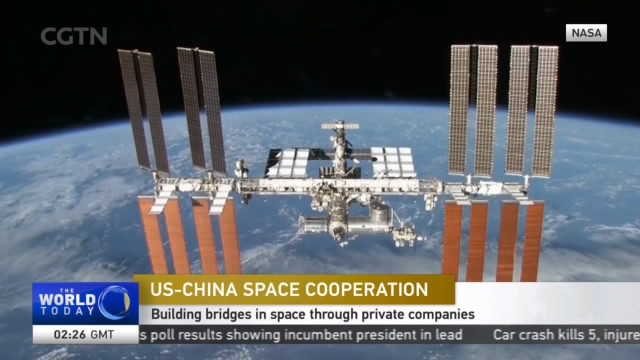
04:43, 09-Aug-2017
US-China Space Cooperation: Building bridges in space through private companies

A historic first in space. It was in June that a U-S company brought a Chinese experiment to the International Space Station. It's an arrangement that was years in the making. CGTN's Sean Callebs covered the launch and has an update on how the project is going.
It looks as though there may very well be another Chinese experiment headed to the International Space Station before the year is out. That's the word from Jeff Manber -the CEO of NanoRacks - a private company that considers itself the concierge to the cosmos.
JEFF MANBER CEO, NANORACKS "We are talking not only with the Beijing institute to do another project --we are talking with other organizations. And I think in the next six months we will do some follow-ups." It took NanoRacks several years to make it onto the I-S-S. In June, a Space-X rocket carried a DNA experiment from researchers at the Beijing Institute to the International Space Station. No small accomplishment- considering there is a federal law that bans NASA -the U.S. Space Agency-- from working with the Chinese. "These are the places we have customers." NanoRacks is cooperating with 30-countries -including China. The company CEO points out there is no law keeping China from working with a PRIVATE U.S. space firm a process made easier considering NanoRacks has its own hardware aboard the ISS.
JEFF MANBER CEO, NANORACKS "We own the platform, so it is not like NASA working directly with the Chinese. We worked really hard to work with some in congress to make sure there is no technology transfer." Manber is well-placed to navigate NanoRacks through the complex maze of bureaucracy, and U.S. government red tape. For nearly a decade - he worked for Russia -marketing the old Mir Space Station to clients.
Soon, NanoRacks will have its own, private air-lock on the ISS -giving it even more access. Before private enterprise invested in space travel - Manber says it would cost at least a million dollars to get an experiment on the ISS. Today - NanoRacks can do the job for as little as 15-thousand. SEAN CALLEBS, CGTN - WASHINGTON.

SITEMAP
Copyright © 2018 CGTN. Beijing ICP prepared NO.16065310-3
Copyright © 2018 CGTN. Beijing ICP prepared NO.16065310-3